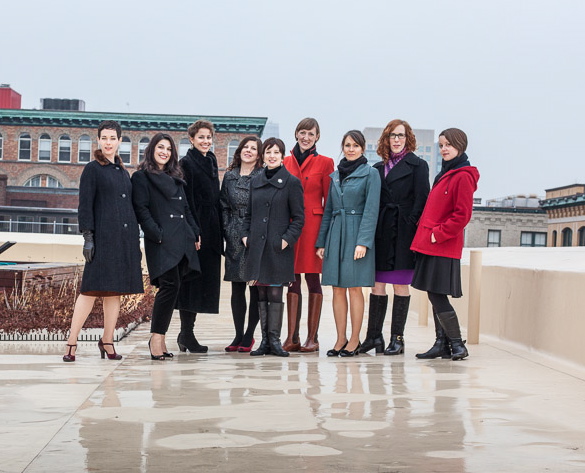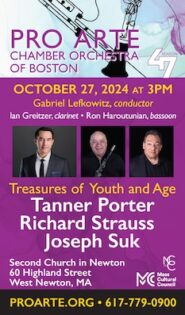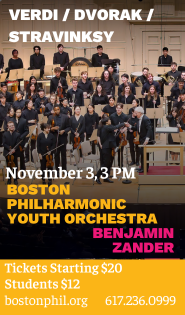Lorelei Ensemble hears America singing, in music old and new
Friday night the Lorelei Ensemble presented “Reconstructed: The New Americana,” an evening of music from old and new America at Boston University’s Marsh Chapel. On the varied and skillfully constructed program were works by early American composer William Billings, 20th-century composers Adam Jacob Simon, Moira Smiley and Dana Maiben, and four world premieres by Scott Ordway, Mary Montgomery Koppel, Joshua Bornfield, and Joshua Shank.
The concert by the all-female vocal octet, proceeded largely uninterrupted thanks to improvisatory interludes played by guest musicians Ashley Addington (flutes) and Shaw Pong Liu (violin). Director Beth Willer invited the audience to applaud the premieres, which were all well received. All four composers were present at the performance.
After a prelude, Lorelei began with Billings’ bruef Africa, followed by Maiben’s Vermont, a setting of Dickinson in a surprisingly modern, almost pop-like tone.
The premiere lineup then began with Ordway’s North Woods, based on the ancient writings of Tacitus, but recast to reflect a northerly atmosphere: wild and distant, austere and stalwart. Ethereal textures and naturalistic sounds were created by the free repetition of text backing a string of duets and solos, the otherworldly tones of the offstage piccolo adding to the atmosphere. Ordway’s writing was both confident and delicate, and the women of Lorelei flourished in the evocative soundscapes and velvet harmonies.
Koppel’s Nokomis’ Fall rounded out the first part of the program. Based on the story of Hiawatha’s grandmother (from Longfellow’s The Song of Hiawatha), the work was more straightforward but still effective, nearly cinematic in its depictions of the dramatic story.
After an interlude, the first section of Bornfield’s five-part Reconstruction was performed. Bornfield’s title is as multifaceted as the American music tradition it references. The composer collected five songs from the revival era of Reconstruction, and cast them as a quasi-Catholic ordinary (Kyrie, Gloria, Credo, Sanctus, Agnus Dei), based on their thematic possibilities. In “Crowns,” a duet leads the main melody interrupted by contraltos in a bit of Ivesian bitonality; the whole thing sprawls out lavishly and chaotically, like a whole congregation with individual stories to tell.
Next was Adam Simon’s Inman, in which the final verse was performed by a six-part ensemble in a unison so unified in timbre and diction as to give the illusion of one voice, but still imbued with the power and soul of six individuals. Two more movements of Bornfield’s Reconstruction reflected most clearly what most would refer to as Americana in music – in turn sweet and brash, open and guarded, boisterous and pious.
Following another interlude was Shank’s Saro, a traditional song about being kept from one’s love. While the opening and closing verses were sung as a solo/duet with violin, the inner stanzas employed drones and canonic entrances to the point of melodic obfuscation, which very effectively set the tone of a distant memory. The return to clarity at the end made the story of estrangement all the more poignant.
Billings appeared on the program once more. His Taunton, which sounds surprisingly contemporary, was wonderfully performed by an unconducted subset of the ensemble. This music offers that quintessential “old time religion,”and the ensemble performed flawlessly with a clear understanding of the text and its tradition.
The fourth installment of Bornfield’s Reconstruction, “Farewell,” was perhaps not as effective as the rest of his work, if only that the other movements had clearly embraced their style and evinced a clear direction. Still, the ensemble performed superbly.
Moira Smiley’s Utopia, a text of Joseph Swain set in 1994, seemed linked to the Billings of two hundred years earlier, a testament both to Smiley’s understanding of the tradition and Billings’ forward-looking voice.
The concert ended with the concluding movement of Reconstruction, “Salvation”, whic neatly reflected this excerpt from the program notes: “What remains constant in American music…is a certain melodic optimism, unapologetic and open. It does not seek a specific order, but rather accepts disorder as an expression of reality.”
Perhaps this is the essence of what we call Americana, that which we inherited and that which we continue to shape today.
The program will be repeated 3 p.m. Sunday, November 2 at Marsh Chapel. loreleiensemble.com.
Posted in Performances


